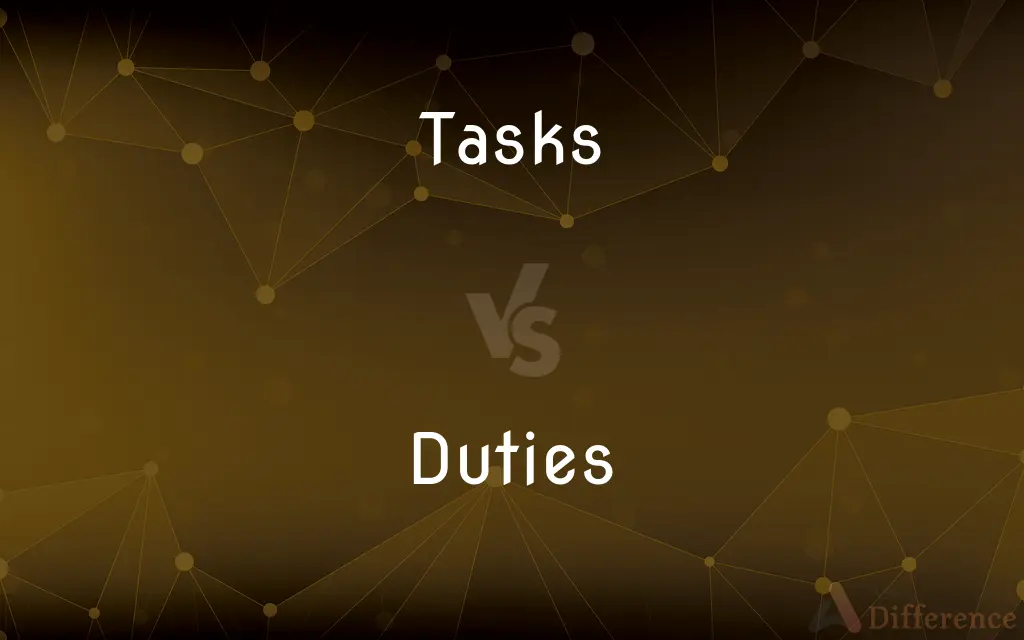Tasks vs. Duties — What's the Difference?
Edited by Tayyaba Rehman — By Fiza Rafique — Published on December 19, 2023
Tasks are specific activities or steps to achieve a goal. Duties are ongoing responsibilities or obligations often associated with a role or position.

Difference Between Tasks and Duties
Table of Contents
ADVERTISEMENT
Key Differences
Tasks represent individual activities or operations that one must complete, often within a specific timeframe. Duties, on the other hand, are more overarching, representing the set of obligations or responsibilities that come with a particular role or position.
Tasks are often measurable and can be ticked off a list once accomplished. Duties are typically more long-term, requiring consistent attention and effort over time. While you might complete specific tasks within a day, duties persist as long as the role or job exists.
Tasks can vary in frequency. Some tasks may be one-off, while others could be recurring. Duties, in contrast, are inherently ongoing and provide the framework within which various tasks are carried out. For instance, a manager's duty might be to oversee a team, but daily tasks could differ.
While tasks are often results-oriented, focusing on achieving a particular outcome, duties tend to emphasize the method or the manner in which something should be done. Duties establish the expectation, while tasks are the actionable steps to meet those expectations.
In essence, while both tasks and duties concern actions and responsibilities, they operate on different scales. Tasks are the smaller steps taken to achieve a broader goal or to fulfill duties that come with a specific role or position.
ADVERTISEMENT
Comparison Chart
Nature
Specific activities or operations
Ongoing responsibilities or obligations
Duration
Short-term or variable
Typically long-term
Measurement
Often measurable and finite
Continuous and harder to quantify
Associated with
Projects, objectives, daily routines
Roles, positions, job descriptions
Purpose
Achieve a particular outcome or goal
Fulfill obligations associated with a position
Compare with Definitions
Tasks
Specific activities aimed at achieving a goal.
The project manager assigned various tasks to her team.
Duties
Commitments related to one's job or role.
The teacher's duties extend beyond the classroom.
Tasks
Units of work to be accomplished within a timeframe.
He had three tasks to complete by the end of the day.
Duties
A set of tasks or activities expected of someone.
The officer's duties were clearly outlined in the job description.
Tasks
Actionable steps in a plan or process.
The software update involved multiple tasks.
Duties
Moral or legal obligations one must fulfill.
Citizens have the duties to abide by the nation's laws.
Tasks
Responsibilities assigned to individuals or groups.
Each member had distinct tasks for the event preparation.
Duties
Responsibilities associated with a role or position.
His duties as a captain include ensuring the team's coordination.
Tasks
Items or actions on a to-do list.
She felt accomplished after ticking off all her tasks.
Duties
Expected behaviors or actions in specific scenarios.
Jury duties require impartiality and attentiveness.
Tasks
A piece of work assigned or done as part of one's duties.
Duties
An act or a course of action that is required of one by position, social custom, law, or religion
The duties of being a critical care nurse.
Tasks
A difficult or tedious undertaking
Finding qualified people to fill these specialized roles was a real task.
Duties
Required action or service
Jury duty.
Beyond the call of duty.
Tasks
A function to be performed; an objective
It is our task to renew consumer confidence.
Duties
Active military service
A tour of duty.
Tasks
To assign a task to or impose a task on
The agency was tasked with creating an advertising campaign.
Duties
Moral or legal obligation
It is your duty to tell the truth.
Tasks
(Archaic) To subject to strain or hardship
"The Professor's household was a modest one, and yet it tasked his ideas to keep it up to his wife's standard" (Edith Wharton).
Duties
The compulsion felt to meet such obligation
Acting out of duty.
Tasks
Plural of task
Duties
A tax charged by a government, especially on imports.
Tasks
Infl of task
Duties
The application of something for a purpose; use
The dining room table also does duty as a desk.
Duties
A measure of efficiency expressed as the amount of work done per unit of energy used.
Duties
The total volume of water required to irrigate a given area in order to cultivate a specific crop until harvest.
Duties
Plural of duty
Common Curiosities
What's the primary difference between tasks and duties?
Tasks are specific activities, while duties are ongoing responsibilities tied to a role.
Can tasks change day-to-day?
Yes, tasks can vary daily, while duties are typically more consistent.
Is there a legal aspect to duties?
Yes, some duties are legally mandated, like duties of care in certain professions.
Do tools exist to help manage tasks?
Yes, many task management tools and software are available for organization.
Is a duty always associated with a job?
While often job-related, duties can also be moral, legal, or societal obligations.
Can one person have multiple duties?
Absolutely, especially in roles with diverse responsibilities.
How specific are tasks compared to duties?
Tasks are typically more specific, focusing on distinct actions, while duties are broader.
Is every task associated with a duty?
Not always, but many tasks arise from the need to fulfill a duty.
Can a duty comprise several tasks?
Yes, a duty often encompasses multiple tasks to fulfill that responsibility.
Are tasks always short-term?
Not always, tasks can be short-term or long-term, but they are specific in nature.
Can tasks be delegated?
Tasks can often be delegated, but the primary responsibility may still reside with the assignee.
Can duties evolve over time?
Yes, duties can change based on roles, societal norms, or legal frameworks.
Who usually assigns tasks?
Tasks can be self-assigned or given by supervisors, team leads, or managers.
Are duties ever contractual?
Yes, many job contracts specify the duties expected of an employee.
Are duties always ongoing?
While duties are often ongoing, some might be temporary based on circumstances.
Share Your Discovery

Previous Comparison
E-Commerce vs. E-Business
Next Comparison
Analog Computers vs. Digital ComputersAuthor Spotlight
Written by
Fiza RafiqueFiza Rafique is a skilled content writer at AskDifference.com, where she meticulously refines and enhances written pieces. Drawing from her vast editorial expertise, Fiza ensures clarity, accuracy, and precision in every article. Passionate about language, she continually seeks to elevate the quality of content for readers worldwide.
Edited by
Tayyaba RehmanTayyaba Rehman is a distinguished writer, currently serving as a primary contributor to askdifference.com. As a researcher in semantics and etymology, Tayyaba's passion for the complexity of languages and their distinctions has found a perfect home on the platform. Tayyaba delves into the intricacies of language, distinguishing between commonly confused words and phrases, thereby providing clarity for readers worldwide.













































